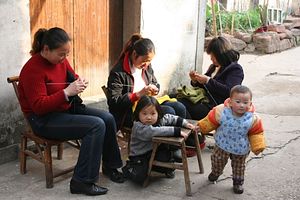When famous Chinese actress and director Xu Jinglei announced in July this year that she had nine of her eggs frozen during a trip to the United States, she elicited intense online debate in China over female reproductive rights, and women’s rights in general. Last week the Wall Street Journal broke the news that another TV celebrity, Zou Qinghong, recently visited the U.S. to undergo the same procedure — one that is illegal for single women in China.
Xu and Zou are among a growing group of professionally-conscious Chinese women choosing to freeze their eggs as an “insurance policy” for the future. While there are no official statistics on the number of women who have done so, medical consultancies note that Chinese demand for overseas in vitro fertilization (IVF) treatment has swollen over the past few years.
Xu’s announcement spurred China’s Central Television (CCTV) to release a firm reminder to the public that while egg freezing is permitted, women must bring to the clinic their government-issued ID, marriage license, and official permission to give birth. That means any woman wishing to freeze her eggs must already be married. The official line is that these restrictions exist to combat a black market and to prevent possible health risks associated with a relatively new procedure.
But of course, there is more to the picture.
In 2007, the All-China Women’s Federation defined unmarried women over the age of 27 as “leftover women,” prompting China’s Ministry of Education to add the term to its official lexicon. This, combined with ingrained gender norms in China’s traditionally patriarchal society, has exacerbated expectations for women to marry earlier. While these expectations are on the decline, the high reputation of marriage is still a stronghold in China.
The Chinese government is also concerned about population decline — and perhaps justifiably so. China’s estimated fertility rate at 1.6 is currently below the replacement fertility level of 2.1, and ranks below industrialized nations like Australia and Belgium. The age imbalance fostered by China’s decades-long one-child policy means that at least in the foreseeable future the working-age population will find it difficult to support the increasingly older population. The fact that the loosening of the rules in 2013 hasn’t reinvigorated the birth rate only adds to the government’s concern. Government concerns over a dwindling population add fuel to social pressure on women to marry young and have children early.
While the Chinese don’t necessarily find the government stance surprising, there is increasing discontent with the state-sanctioned, family-driven social pressures and legal customs that have rolled back progress in gender parity, and that have allowed the state to continuously intervene in individual fertility decisions.
In the social media firestorm that followed Xu Jinglei’s confession, influential Chinese blogger Han Han posted on Weibo — the Chinese version of Twitter — “women are not men’s child-rearing machines or walking wombs.” In a similar vein, many were outraged about the double standard imposed on women, as Chinese men are perfectly free to do what they choose with their sperm.
These comments highlight a state rhetoric that sits uncomfortably with Xi’s recent “commitment to gender equality and women’s development,” especially in light of the 20th year anniversary of the landmark Fourth World Conference on Women held in Beijing. As many media commenters have pointed out, Xi’s eagerness to promote women’s rights abroad contradicts his record at home.
With increasing urbanization and pressures for young women to financially support their elders, China’s ban on egg freezing for single women seems to be out of tune with the times. For the time being, however, those without the financial means to jet off abroad will just have to hope that they can beat their biological clocks.

































